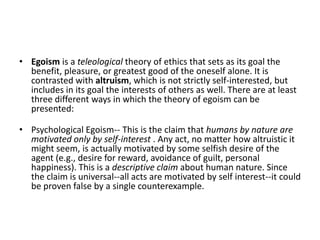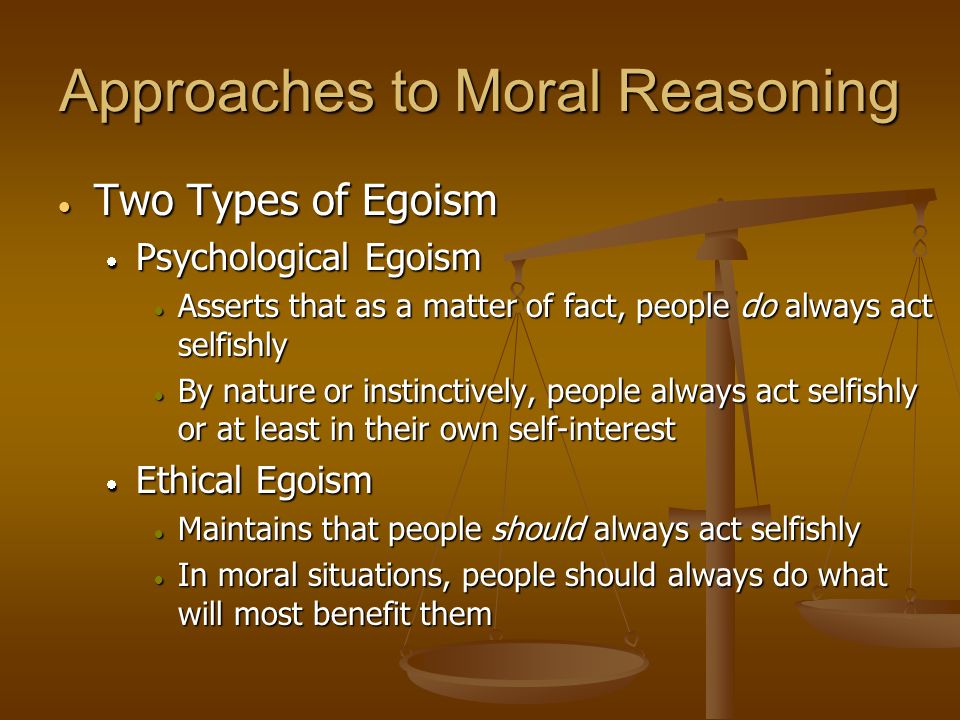Ethical egoism is the ethical theory that an individual should act in their own self-interest, and that self-interest should be the guiding principle of one's actions. This theory is based on the belief that acting in one's own self-interest is ultimately the most ethical thing to do, because it leads to the greatest happiness or well-being for the individual.
According to ethical egoism, the pursuit of one's own interests is not only morally acceptable, but is actually morally required. This is because, according to the theory, the ultimate goal of ethics is to maximize the well-being or happiness of the individual, and this can only be achieved by acting in one's own self-interest.
There are several arguments that have been made in support of ethical egoism. One argument is that acting in one's own self-interest is natural and instinctive, and therefore must be morally acceptable. This argument suggests that our natural desire to pursue our own interests is a fundamental part of human nature, and therefore cannot be considered wrong or immoral.
Another argument for ethical egoism is that it promotes individual freedom and autonomy. According to this argument, ethical egoism allows individuals to make their own decisions about what is in their own best interests, rather than being dictated to by external moral authorities. This, in turn, allows individuals to live their lives as they see fit, rather than being forced to conform to the expectations or values of others.
However, ethical egoism also has its critics. One common criticism is that it is self-centered and ignores the needs and interests of others. Ethical egoism may lead individuals to prioritize their own interests over the interests of others, even if doing so causes harm or suffering to others. This can lead to conflicts of interest and may result in social or ethical problems.
Another criticism of ethical egoism is that it is ultimately selfish and lacks a sense of moral responsibility to others. While it may be acceptable to act in one's own self-interest, this does not mean that we should ignore the needs and interests of others entirely. Ethical egoism may lead individuals to prioritize their own interests over the interests of others, even if doing so causes harm or suffering to others. This can result in a lack of concern for the well-being of others, and may ultimately undermine the foundations of a healthy and just society.
In conclusion, ethical egoism is a controversial ethical theory that holds that acting in one's own self-interest is the most ethical thing to do. While it may have some appealing aspects, such as promoting individual freedom and autonomy, it also has significant drawbacks, including its potential to be self-centered and lacking in moral responsibility to others. Ultimately, the validity of ethical egoism as a viable ethical theory remains open to debate.
Egoism types

In an ingenious series of experiments, Batson compared the egoistic hypotheses, one by one, against the altruistic hypothesis. A bigger problem for psychological egoism is that some behavior does not seem to be explained by self-regarding desires. When I make an imprudent choice, this does not count against ethical egoism, and in favor of a theory recommending imprudence. This argument seems logical, but when we consider that there are some people who may not be able to financially support themselves, such as children or individuals with illnesses or disabilities, we know that the end result is that some people will be better off financially and others will be worse off financially. Even if evolutionary arguments can be met, however, psychological egoism faces the problems noted earlier. Each person needs the cooperation of others to obtain goods such as defense or friendship.
What Is Ethical Egoism?

The Intuition Argument is interesting. If there is a tie between what increases reproductive fitness and belief, and believing that rational egoism is true is best for reproductive fitness, one would expect many to believe that rational egoism is true. There are distinct versions of psychological egoism that define the actions performed out of self-interests. De Lazari-Radek and Singer reply that the recommendations of rational egoism are very close to those of kin altruism, and much closer to those of kin altruism than are the recommendations of utilitarianism 2014 194. Ethical egoism goes against the principle of impartiality. But a neater reply is to move to rational egoism, which makes claims about what one has reason to do, ignoring the topic of what is morally right. The rational egoist cannot argue that egoism is the most minimal theory, and that standard moral theories, by requiring more of people, require special, additional justification.
Ethical Egoism

Examples include large fisheries, the atmosphere and the ocean. People walk by, look at her, and keep walking. Furthermore, a logically consistent ethical egoist may even seek to harm his friends if it suddenly becomes in his self-interest to do so. Another problem is that guilt may presuppose that the soldier has a non-self-regarding desire for doing what he takes to be right. You can have internal and external versions of this benefit, which involves how we see ourselves and how others see us. I might, for example, profit more from helping the local Opera society refurbish its hall than I would from giving to famine relief in Africa, but standard moral theories would rank famine relief as more important than Opera hall improvements. In principle, it seems possible to show this by showing that non-self-regarding desires do not continue for long once their connection to our welfare is broken.
Ethical Egoism

See, I told you not to worry - no one's judging you here. Therefore, it is reasonable to believe that if we set out to be 'our brother's keeper,' we would often bungle the job and end up doing more mischief than good. Unless I can explain why blue-eyed people are to be preferred, my claim looks arbitrary, in the sense that I have given no reason for the different treatments. The altruistic hypothesis also has some of the same problems: for example, just as there might not be enough pain, the non-instrumental desire that the child do well might not be strong enough to defeat other desires. Parental care might also be explained on altruistic grounds: the parent has a non-instrumental desire that the child do well. It has been argued that ethical egoism can lend itself to individualist anarchism such as that of Benjamin Tucker, or the combined anarcho-communism and egoism of Emma Goldman, both of whom were proponents of many egoist ideas put forward by Max Stirner. That is, a commons forbidding homesteading requires regulation.
Egoism (Stanford Encyclopedia of Philosophy)

Then we focus on offering preferential treatment internally or to our external factors. Against the second inconsistency charge, the ethical egoist can claim that she morally recommends that B go to the game, although she desires that B not go. Discussing the following questions will help you analyze and evaluate ethical egoism. Clearly, then, even if smith does not confess, you will still be better off if you do. At the same time, we know the desires and needs of others only imperfectly, and we are not well situated to pursue them. Even in the case of A, what grounds my care are these connections, not identity: my relation to A is the same as my relation to B or C , so what grounds my care about A grounds my care about B or C — and that cannot be identity. We are capable of acting with regard for others; we are capable of acting altruistically.







